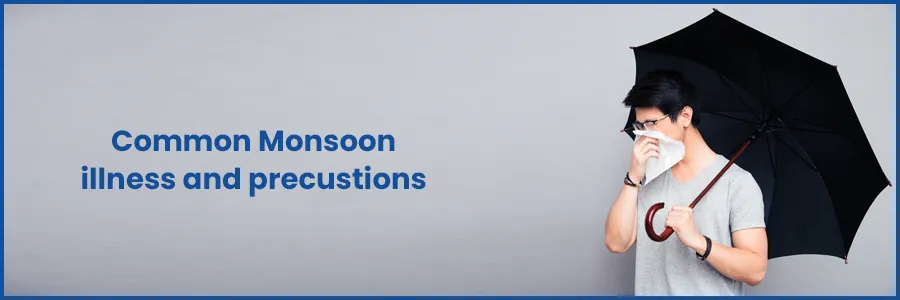- Cardiology 84
- Dermatology 45
- Endocrinology 33
- ENT 16
- Fertility 190
- Gastroenterology 78
- General-Medicine 81
- Gynecology 80
- Hematology 19
- Infectious-Diseases 33
- Neurology 52
- Oncology 34
- Ophthalmology 23
- Orthopedics 69
- Pediatrics 31
- Procedure 23
- Public-Health 144
- Pulmonology 59
- Radiology 8
- Urology 68
- Wellness 161
- Woman-and-child 77

Monsoon Diseases: Precautions for a Healthy Season
The monsoon season provides relief from the intense summer heat, yet it also heightens the risk of several diseases. Increased humidity and stagnant water create ideal breeding grounds for bacteria, viruses, and mosquitoes, leading to waterborne and vector-borne diseases. During this time, communities face heightened challenges in maintaining public health due to these conditions.
In this blog, we will explore into common monsoon diseases and provide practical precautions to help you and your loved ones stay healthy during the rainy season. By understanding these risks and taking proactive measures, you can minimise the impact of monsoon-related illnesses and enjoy a safer, healthier season.
Secure your health with a second opinion. Make informed decisions and book your appointment today!
Get A Second OpinionCommon Monsoon Illnesses
Malaria
- Transmitted by female Anopheles mosquitoes carrying the Plasmodium parasite.
- Symptoms include high fever, chills, headache, and body aches.
- Preventive measures: Use mosquito repellents, sleep under nets, and avoid outdoor activities during peak mosquito times.
Dengue Fever
- Viral infection spread by mosquitoes.
- Symptoms: High fever, severe headaches, joint and muscle pain, skin rashes, bleeding in severe cases.
- Preventive measures: Eliminate mosquito breeding sites, wear protective clothing, and use mosquito screens.
Cholera
- Waterborne disease caused by Vibrio cholerae bacterium.
- Symptoms: Severe watery diarrhea, and dehydration.
- Preventive measures: Maintain hygiene, drink boiled/purified water, and avoid raw seafood.
Typhoid Fever
- Waterborne illness caused by Salmonella typhi bacterium.
- Symptoms: Prolonged fever, headache, fatigue, gastrointestinal problems.
- Preventive measures: Practice hand hygiene and consume hygienically prepared food.
Respiratory Infections
- Increase during monsoon (cold, flu, viral fever).
- Prevent spread: Maintain hand hygiene, avoid close contact with sick individuals, and wear masks in crowded areas.
Ready to take control of your health journey? Book your appointment now and start your path towards wellness today!
Book an AppointmentPrecautions to Stay Healthy During Monsoon
Stay Hydrated
- Drink plenty of purified water throughout the day to stay hydrated, especially in humid conditions and after physical activities.
Maintain Hygiene
- Wash hands frequently with soap and water, particularly before eating and after using the bathroom.
- Keep living areas clean and dry to prevent bacterial and fungal growth.
Avoid Street Food
- Refrain from consuming street food as it may not be hygienically prepared, increasing the risk of foodborne illnesses.
Use Mosquito Repellents
- Apply mosquito repellents on exposed skin to prevent mosquito bites.
- Use mosquito nets while sleeping to create a barrier against mosquitoes.
Stay Informed
- Stay updated with local health advisories and follow recommended preventive measures by health authorities.
Vaccinations
- Ensure everyone in your family is up-to-date with vaccinations, especially those recommended during the monsoon season.
Proper Footwear
- Wear closed shoes or rubber sandals on muddy and slippery surfaces to protect your feet from waterborne infections and injuries.
Avoid Walking in Floodwaters
- Stay away from flooded areas as they may contain sewage and other harmful substances.
Conclusion
As the monsoon season begins, it's crucial to prioritize health by understanding common illnesses like malaria, dengue fever, cholera, typhoid fever, and respiratory infections. Simple preventive measures such as using mosquito repellents and nets, maintaining hygiene, and staying hydrated can significantly reduce risks.
Staying informed about local health alerts and getting vaccinated adds extra protection. Let's enjoy the monsoon responsibly, ensuring a safe and healthy season for everyone.
Frequently Asked Questions
The common monsoon illnesses to be cautious of include malaria, dengue fever, cholera, typhoid fever, and respiratory infections like the common cold and flu.
To protect yourself from mosquito-borne diseases, use mosquito repellents on exposed skin, sleep under mosquito nets, and avoid outdoor activities during peak mosquito activity times.
To prevent waterborne diseases, maintain proper hygiene, drink boiled or purified water, and avoid eating raw or undercooked seafood during the monsoon season.
To protect your family from respiratory infections, maintain good hand hygiene, avoid close contact with sick individuals, and consider wearing masks in crowded places.
It is essential to ensure you and your family are up-to-date with vaccinations, especially for diseases prevalent during the monsoon season. Consult with your healthcare provider for specific recommendations.
It is best to avoid eating street food during the monsoon season, as it may not be hygienically prepared and can lead to foodborne illnesses.
Wear closed shoes or rubber sandals to protect your feet from waterborne infections and avoid walking in floodwaters, which may be contaminated with sewage and harmful substances.
It is best to stay away from flood-affected areas, as they may pose health risks due to contaminated water and other hazards.
Other general precautions include staying hydrated, maintaining proper hygiene, and being informed about local health advisories.
Embrace the monsoon season with awareness and responsibility. Enjoy indoor activities, spend time with loved ones, and appreciate the beauty of nature while taking necessary precautions to stay healthy.

- Cardiology 2132
- Dermatology 168
- Endocrinology 135
- ENT 97
- Fertility 217
- Gastroenterology 232
- General 478
- General-Medicine 1685
- Gynecology 169
- Hematology 85
- Infectious-Diseases 208
- Neurology 207
- Oncology 345
- Ophthalmology 65
- Orthopedics 187
- Pediatrics 83
- Procedure 72
- Public-Health 209
- Pulmonology 126
- Radiology 13
- Second Opinion 311
- Urology 294
- Wellness 600
- Woman-and-child 447
Related Blogs
If you have any questions, please fill out the enquiry form or call us, and we will get back to you promptly.
040-68334455